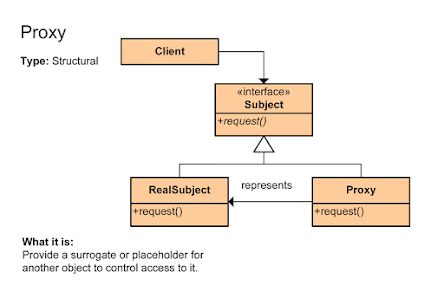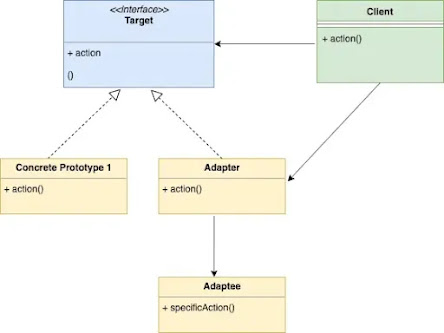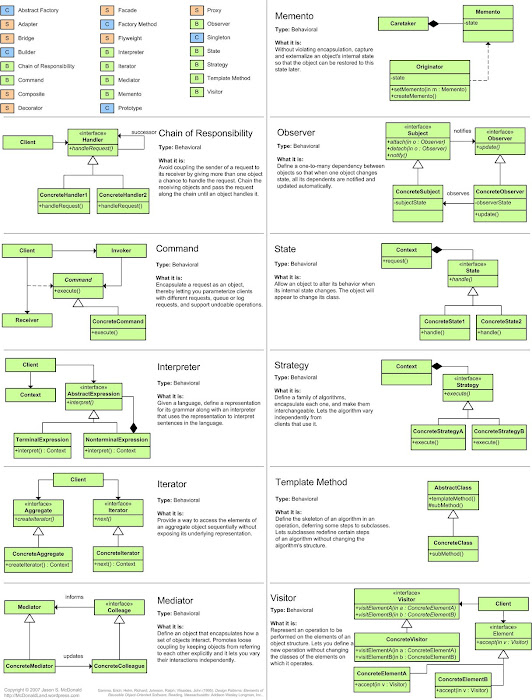Though both Proxy and Decorator pattern looks very similar to each other
structurally, there are some key differences between them. Main difference
between Decorator and Proxy patterns comes from their Intent. Proxy word has a
long standing meaning and in software world also a Proxy class stands for its
implementation class, which presents lots of options to programmer, resulting in
different kinds of proxy objects like remote proxy, virtual proxy, and
protection proxy. On the other hand, Decorator pattern is used to add new
functionality into existing object without modifying it's class. So their usage
is entirely different.
1. Proxy is used to control access while Decorator is used to add additional functionality without modifying the class itself.
2. In case of Proxy patter, Proxy class hide details of implementation class while in case of Decorator, implementation class is exposed to client.
3. In case of Proxy, relationship between implementation and Proxy is known at compile time but in case of Decorator, implementation class are passed at runtime.
1. Both Proxy and Decorator implements same interface as actual class, so that they can stand in their places like passed to a method which accept actual class or can return from a method which returns interface of actual class.
2. Both uses delegation to get things done.
3. both pattern allows you to add new functionality before and after calling method on implementation class.
Difference between Proxy vs Decorator Pattern in Java
Here are some notable difference between them :1. Proxy is used to control access while Decorator is used to add additional functionality without modifying the class itself.
2. In case of Proxy patter, Proxy class hide details of implementation class while in case of Decorator, implementation class is exposed to client.
3. In case of Proxy, relationship between implementation and Proxy is known at compile time but in case of Decorator, implementation class are passed at runtime.
Proxy and Decorator Pattern in Java - Similarties
Now, let's checkout some similarities between Proxy and Decorator Pattern in Java:1. Both Proxy and Decorator implements same interface as actual class, so that they can stand in their places like passed to a method which accept actual class or can return from a method which returns interface of actual class.
2. Both uses delegation to get things done.
3. both pattern allows you to add new functionality before and after calling method on implementation class.
And, if you want to learn more about object oriented design Patterns, here is a Java design pattern cheatsheet to take print and study
Other Java Design Patterns tutorials you may like
- 5 Free Courses to learn Object Oriented Programming (courses)
- 18 Java Design Pattern Interview Questions with Answers (list)
- Difference between Factory and Abstract Factory pattern in Java (answer)
- How to design a Vending Machine in Java? (questions)
- 20 System Design Interview Questions (list)
- Difference between Factory and Dependency Injection Pattern? (answer)
- How to create thread-safe Singleton in Java? (example)
- How to implement the Strategy Design Pattern in Java? (example)
- Difference between Factory and AbstractFactory Pattern? (example)
- How to get a method of HashMap to work internally in Java? (answer)Difference between Abstraction and Encapsulation in Java? (answer)
- Difference between State and Strategy Design Pattern in Java? (answer)
- Top 5 Courses to learn Design Patterns in Java (courses)
- 5 Free Courses to learn Data Structure and Algorithms (courses)
Thanks a lot for reading this article so far. If you like this Decorator vs Proxy design pattern tutorial in Java then please share it with your friends
and colleagues. If you have any questions or feedback then please drop a
note.
P. S. - If you want to learn more about design patterns and how
they can help you to write better code in Java, I suggest you take a
look at the Java Design Patterns and Architecture - a Free course on Udemy.



No comments:
Post a Comment
Feel free to comment, ask questions if you have any doubt.